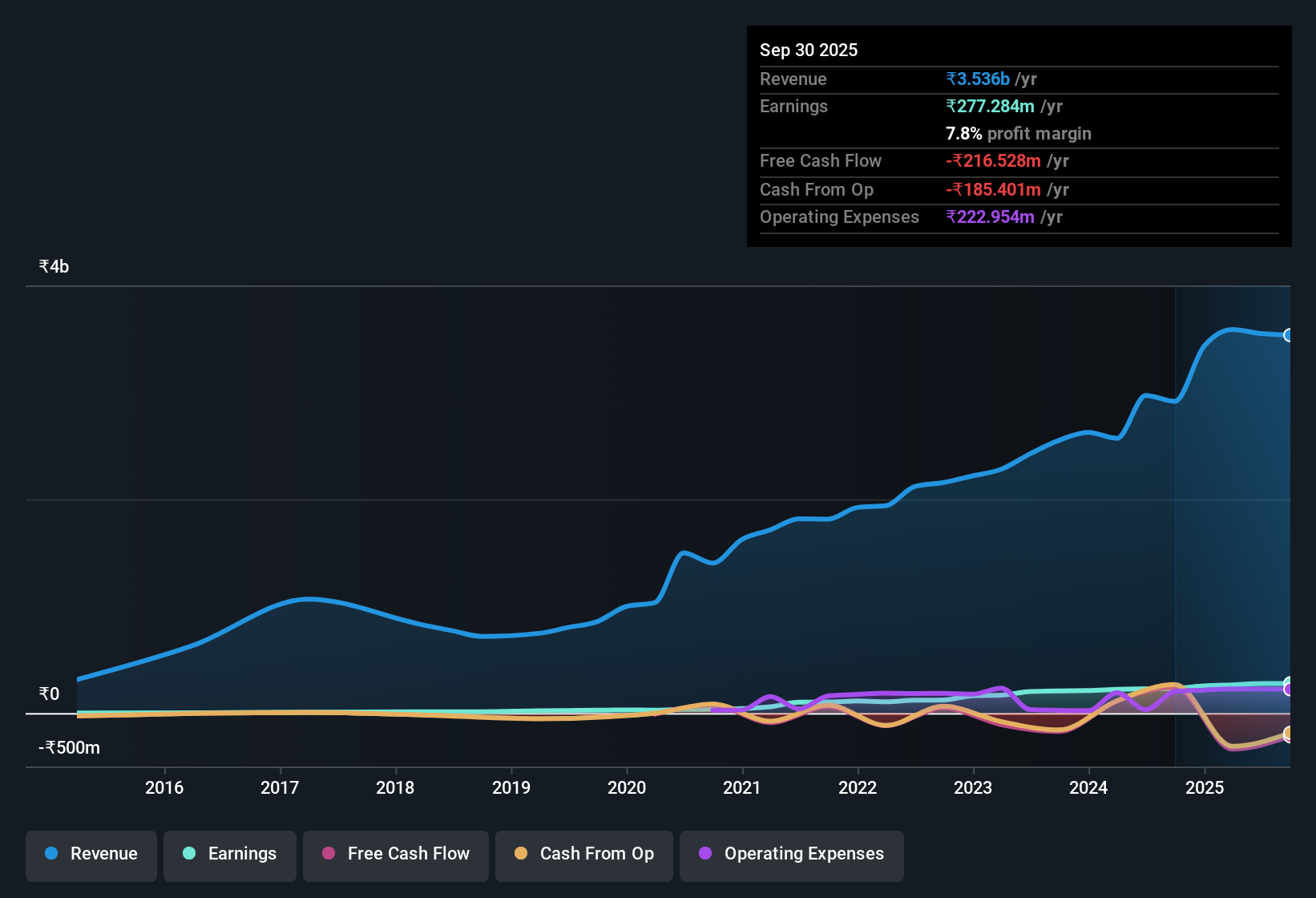Bombay Super Hybrid Seeds' (NSE:BSHSL) Shareholders May Want To Dig Deeper Than Statutory Profit
Bombay Super Hybrid Seeds Limited's (NSE:BSHSL) healthy profit numbers didn't contain any surprises for investors. However the statutory profit number doesn't tell the whole story, and we have found some factors which might be of concern to shareholders.

Examining Cashflow Against Bombay Super Hybrid Seeds' Earnings
Many investors haven't heard of the accrual ratio from cashflow, but it is actually a useful measure of how well a company's profit is backed up by free cash flow (FCF) during a given period. In plain english, this ratio subtracts FCF from net profit, and divides that number by the company's average operating assets over that period. The ratio shows us how much a company's profit exceeds its FCF.
That means a negative accrual ratio is a good thing, because it shows that the company is bringing in more free cash flow than its profit would suggest. While having an accrual ratio above zero is of little concern, we do think it's worth noting when a company has a relatively high accrual ratio. That's because some academic studies have suggested that high accruals ratios tend to lead to lower profit or less profit growth.
Over the twelve months to September 2025, Bombay Super Hybrid Seeds recorded an accrual ratio of 0.36. Therefore, we know that it's free cashflow was significantly lower than its statutory profit, raising questions about how useful that profit figure really is. Over the last year it actually had negative free cash flow of ₹217m, in contrast to the aforementioned profit of ₹277.3m. We saw that FCF was ₹242m a year ago though, so Bombay Super Hybrid Seeds has at least been able to generate positive FCF in the past. The good news for shareholders is that Bombay Super Hybrid Seeds' accrual ratio was much better last year, so this year's poor reading might simply be a case of a short term mismatch between profit and FCF. Shareholders should look for improved cashflow relative to profit in the current year, if that is indeed the case.
Note: we always recommend investors check balance sheet strength. Click here to be taken to our balance sheet analysis of Bombay Super Hybrid Seeds.
Our Take On Bombay Super Hybrid Seeds' Profit Performance
As we discussed above, we think Bombay Super Hybrid Seeds' earnings were not supported by free cash flow, which might concern some investors. For this reason, we think that Bombay Super Hybrid Seeds' statutory profits may be a bad guide to its underlying earnings power, and might give investors an overly positive impression of the company. But the good news is that its EPS growth over the last three years has been very impressive. The goal of this article has been to assess how well we can rely on the statutory earnings to reflect the company's potential, but there is plenty more to consider. If you want to do dive deeper into Bombay Super Hybrid Seeds, you'd also look into what risks it is currently facing. For example - Bombay Super Hybrid Seeds has 1 warning sign we think you should be aware of.
Today we've zoomed in on a single data point to better understand the nature of Bombay Super Hybrid Seeds' profit. But there is always more to discover if you are capable of focussing your mind on minutiae. For example, many people consider a high return on equity as an indication of favorable business economics, while others like to 'follow the money' and search out stocks that insiders are buying. While it might take a little research on your behalf, you may find this free collection of companies boasting high return on equity, or this list of stocks with significant insider holdings to be useful.
Valuation is complex, but we're here to simplify it.
Discover if Bombay Super Hybrid Seeds might be undervalued or overvalued with our detailed analysis, featuring fair value estimates, potential risks, dividends, insider trades, and its financial condition.
Access Free AnalysisHave feedback on this article? Concerned about the content? Get in touch with us directly. Alternatively, email editorial-team (at) simplywallst.com.
This article by Simply Wall St is general in nature. We provide commentary based on historical data and analyst forecasts only using an unbiased methodology and our articles are not intended to be financial advice. It does not constitute a recommendation to buy or sell any stock, and does not take account of your objectives, or your financial situation. We aim to bring you long-term focused analysis driven by fundamental data. Note that our analysis may not factor in the latest price-sensitive company announcements or qualitative material. Simply Wall St has no position in any stocks mentioned.
About NSEI:BSHSL
Bombay Super Hybrid Seeds
Engages in the research, production, processing, and marketing of hybrid and GM seeds in India.
Adequate balance sheet with acceptable track record.
Similar Companies
Market Insights
Community Narratives




